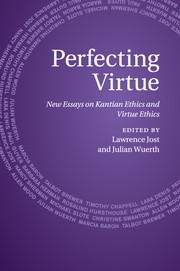Book contents
- Frontmatter
- Contents
- Notes on contributors
- Acknowledgements
- List of abbreviations
- Introduction
- 1 Virtue ethics in relation to Kantian ethics: an opinionated overview and commentary
- 2 What does the Aristotelian phronimos know?
- 3 Kant and agent-oriented ethics
- 4 The difference that ends make
- 5 Two pictures of practical thinking
- 6 Moving beyond Kant's account of agency in the Grounding
- 7 A Kantian conception of human flourishing
- 8 Kantian perfectionism
- 9 Aristotle, the Stoics, and Kant on anger
- 10 Kant's impartial virtues of love
- 11 The problem we all have with deontology
- 12 Intuition, system, and the “paradox” of deontology
- Bibliography
- Index
12 - Intuition, system, and the “paradox” of deontology
Published online by Cambridge University Press: 04 February 2011
- Frontmatter
- Contents
- Notes on contributors
- Acknowledgements
- List of abbreviations
- Introduction
- 1 Virtue ethics in relation to Kantian ethics: an opinionated overview and commentary
- 2 What does the Aristotelian phronimos know?
- 3 Kant and agent-oriented ethics
- 4 The difference that ends make
- 5 Two pictures of practical thinking
- 6 Moving beyond Kant's account of agency in the Grounding
- 7 A Kantian conception of human flourishing
- 8 Kantian perfectionism
- 9 Aristotle, the Stoics, and Kant on anger
- 10 Kant's impartial virtues of love
- 11 The problem we all have with deontology
- 12 Intuition, system, and the “paradox” of deontology
- Bibliography
- Index
Summary
Provided you start from suitable intuitions, it is easy enough to construct a whole range of arguments any or all of which might be called “the paradox of deontology.” Suppose you think that the role of agency is to bring about goodness, and that it's good to observe deontological constraints. Then it will follow that you should bring about the observing of deontological constraints. And if in some particular context the way to bring about such observings is via a breach of one or more deontological constraints, so be it.
Or suppose, more strongly, that you think that the role of agency is to bring about maximal goodness, and that the keeping of the maximum number of deontological constraints (or the maximum weighting, if some constraints are more important than others) is a crucial part of maximal goodness. Then it will follow that you should bring this about. And again, if the route to doing this sometimes runs via the breaching of one or more deontological constraints, so be it.
Or take a more particular supposition: suppose you think that an important part of agency is to bring about the specific good that persons (or their rights) are not violated (perhaps in the way that, for example, torture or murder or rape violates them/their rights). Then you will think that agents including yourself have reason, so far as that part of agency goes, to bring about the non-violation of (the rights of) persons.
- Type
- Chapter
- Information
- Perfecting VirtueNew Essays on Kantian Ethics and Virtue Ethics, pp. 271 - 288Publisher: Cambridge University PressPrint publication year: 2011
- 2
- Cited by

